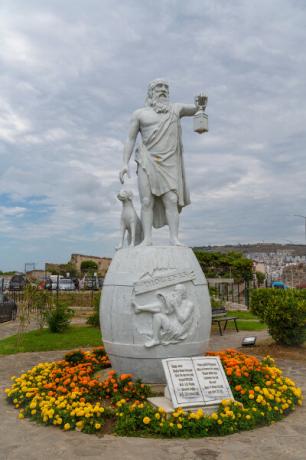In the state of nature, claims Rousseau, man had an essentially animal life. The rough existence of forests made him a robust being, agile, with heightened senses, little subject to diseases, most of which are born of civilized life. His intellectual activity in these times was nil: "the man who meditates is a depraved animal”. Living in this way, man was happy and his only passions were natural instincts, easily satisfied (thirst, hunger, sexual reproduction, preservation).
It is, in fact, the main point of Rousseau's argument: nature would not destine primitive man to life in society. For thousands of centuries perhaps, man lived alone and independently, and this state was the essential element of his happiness or well-being. Therefore, he would only distinguish himself from animals for his greater intelligence, for his awareness of being free and not being subjected to develop.
Having condemned the spirit of modern civilization, Rousseau attacks the very organization of society. On the subject of a new competition at the academy of Dijon in 1753, which had as its theme “what is the origin of inequality between men and if it it is authorized by natural law”, Rousseau says: man's freedom is increasingly threatened because social inequality is growing. And seeking to remedy this situation will be the object of
Social contract, in which the author does not intend to study the historical development of slavery, but the foundations of inequality.According to Rousseau, as seen above, men naturally exercise their instincts, being neither good nor bad, but an amoral being. This means that in nature men do not attack each other without motivation, but only in self-defence. Furthermore, inequality arises when someone surrounds a plot of land and says “this is mine”. As a result, other men are led to do the same thing and get together or associate themselves to be able to enjoy what the earth can offer them. But this also creates an organized mode of survival that excludes most men from the benefits of nature. Now, deprived of his food and his freedom, because of the institution of private property, man becomes subordinate to those who own it. Ownership makes you lose natural freedom.
Do not stop now... There's more after the advertising ;)
It is therefore necessary to restore the minimum of freedom to civilized man. In society, there are vices that distance you from your nature and rethinking the natural model is a way to bring them closer again. Thus, one thinks about the Contract, not to return to the natural state, which Rousseau believes to be impossible, but to try to reduce inequalities between men after the arbitration of the institution of property. Nature made man free. But society exists, "man was born free and everywhere he sees himself chained”. The unfair contract in which the strong subjugate the weak must be replaced by a new contract that assures each citizen the protection of the community and allows him the advantages of freedom and equality. While some philosophers studied the historical forms of government, Rousseau meditated on what a just society should be and, by placing his absolute principles (freedom and natural equality), he drew his conclusions of universal value, which inspired the French Revolution.
By João Francisco P. Cabral
Brazil School Collaborator
Graduated in Philosophy from the Federal University of Uberlândia - UFU
Master's student in Philosophy at the State University of Campinas - UNICAMP
Philosophy - Brazil School
Would you like to reference this text in a school or academic work? Look:
CABRAL, João Francisco Pereira. "Rousseau: Inequality and Contract"; Brazil School. Available in: https://brasilescola.uol.com.br/filosofia/rousseau-desigualdade-contrato.htm. Accessed on June 29, 2021.

